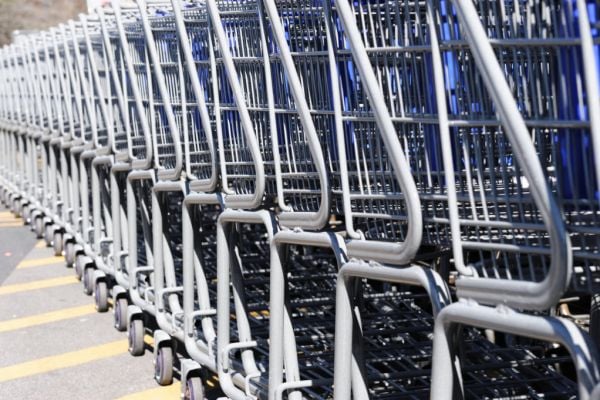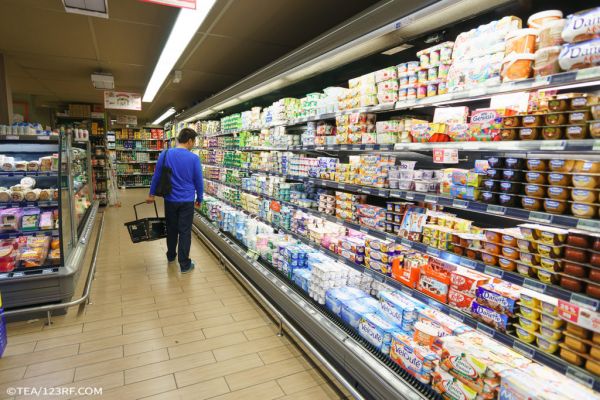While China’s online shopping giant Alibaba Group Holding Ltd. racked up $18 billion of sales over a single day last month, a broader picture of retail conditions isn’t as rosy when it includes brick-and-mortar shops in China.
Foot traffic to malls and restaurants declined in November amid a surge in online shopping activity, according to data from Baidu Inc., operator of the nation’s dominant search engine, and No. 2 e-commerce platform JD.com Inc. Consumer confidence and box office receipts edged down, while car sales got a lift from tax breaks.
China’s increasingly wealthy consumers are developing more sophisticated tastes for pricier Japanese diapers, Brazilian nuts or German kitchenware, usually via online platforms like Alibaba’s shopping colossus Taobao.com or JD’s Amazon-like site. Beyond that frenzy, official data due for release Tuesday may show offline conditions were more subdued.
Retail sales probably rose to a 10.2%year-on-year pace in November, according to a Bloomberg survey of economists as of late Friday. The prior month’s 10% gain was among the weakest readings in the past decade, National Bureau of Statistics data show.
“China’s two-speed scenario is having a major impact on the country’s retail industry,” Jason Yu, general manager for China at consumer research firm Kantar Worldpanel, wrote in a recent report. “This massive explosion of online sales growth is being fueled by increasing diversification in the categories purchased online, as well as huge gains in imported products and consumers taking advantage of promotions.”
Fewer consumers visited malls and restaurants in November compared to a month earlier, according to indexes developed by Baidu, which serves 6 billion searches a day and dominates mobile mapping. The gauges were based on location data on mobile users.
The number of tourists also slumped, largely due to the high base comparison to October, when hundreds of millions of Chinese travel during the Golden Week national holiday.
Sales of everything from food to furniture surged to a record last month, according to JD Finance, a unit of e-commerce platform JD.com. Transactions spike each November, which includes China’s annual online shopping bonanza Singles’ Day each 11 November.
The Westpac MNI China Consumer Sentiment Indicator edged down to 114.9 in November from 117.1 in October as shoppers showed less willingness to buy large household items.
“The gradual improvement in the consumer mood over the last two years, from extreme lows in late 2014, seems to again be losing its way,” Matthew Hassan, a Sydney-based senior economist at Westpac Banking Corp., wrote in a statement. “With confidence still materially below long-run averages and consumers still concerned about job security and the economic outlook the consumer recovery is clearly still fragile.”
The film “Doctor Strange” starring Benedict Cumberbatch proved less of a draw for China’s moviegoers last month than “Captain America” and “Iron Man” did for receipts earlier this year. Cinemas took in 2.54 billion yuan (368 million), almost a third of that coming from "Doctor Strange," according to entertainment research firm EntGroup Inc. in Beijing. November trailed the 6.9 billion yuan haul in February, when the madcap love story “The Mermaid” became the biggest-grossing movie ever in China.
Box office, while volatile and seasonal, is an emerging battleground for global entertainment companies aiming to attract Chinese consumers seeking high-quality recreational activities.
Auto sales have already extended a record for the 26th year, surpassing last year’s tally in November, according to the China Passenger Car Association. A concern is that the streak may end if the government doesn’t extend a tax break issued last year.
The MNI China Car Purchase Sentiment Indicator edged down to 88.3 in November from 90 in the prior month as consumers expected higher running costs. “The planned car budget of Chinese families continued to trend toward the middle ranges in November with the more expensive bands falling out of favor,” MNI analysts wrote in a statement.
News by Bloomberg, edited by ESM. To subscribe to ESM: The European Supermarket Magazine, click here.














